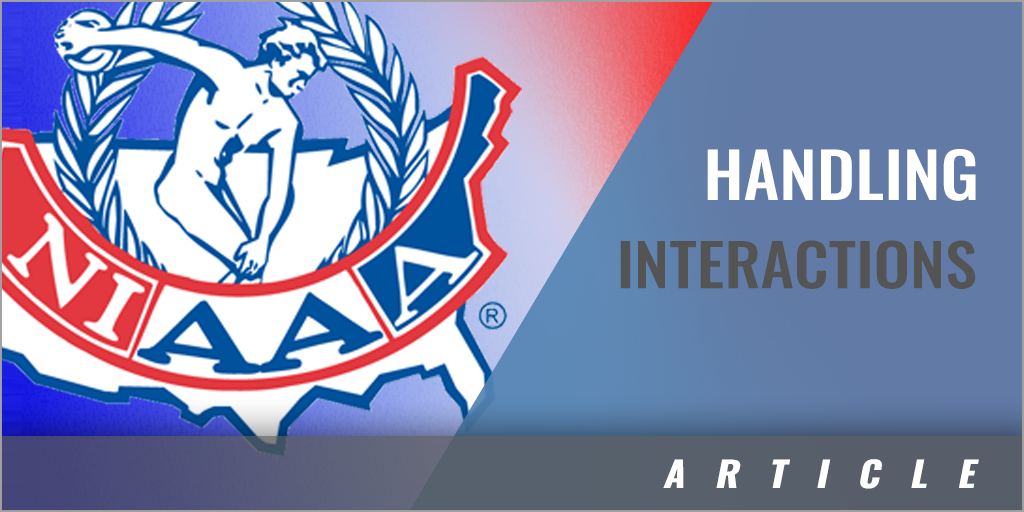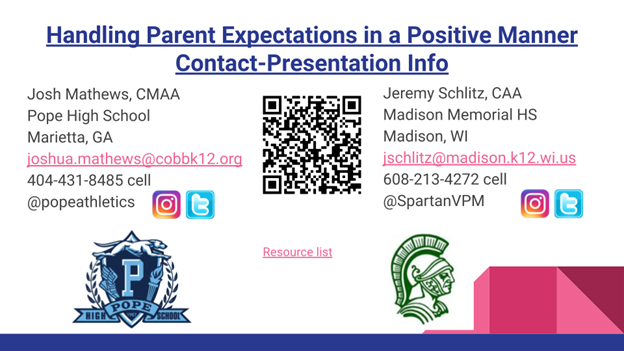|
By: Josh Mathews, CMAA - Pope High School, (GA) and Jeremy Schlitz, CAA - Madison Metropolitan School District (WI) Education-based athletics offer an excellent opportunity for young students to learn valuable life skills such as leadership, teamwork, and perseverance. However, as with any activity that involves children, there is a need and intrinsic valuation from and based on parent involvement. In some cases, parents may negatively impact the experience for their children, coaches, and other parents. As athletic administrators we want to be proactive and minimize any negative impact through communication, foundation setting, and systems to reach all in the athletic community and support network. To address this issue, the National Athletic Director Conference (NADC) recently held a workshop on handling parent interactions in a positive manner led by Joshua Mathews and myself. This article can hopefully explain the workshop, provide strategies for a positive approach, and provide you with tools to improve your programs, communications, and well-being. Education-based athletics are focused on providing students with opportunities to learn and grow, which sometimes may conflict with experiences families have in youth or club sports. To avoid conflicts between parents and coaches, it is important to establish expectations for all involved in the interscholastic athletics program. Coaches should be transparent about their coaching philosophy and communicate their goals and objectives with parents clearly along with taking feedback at an early- or pre-season meeting to make sure students lead the culture and communications. Parents often feel the need to push their children to succeed, which can create a stressful environment. To avoid this, coaches should focus on creating a positive environment that emphasizes effort over results and uses defined communication protocols and student voice. Using a consistent message in communication such as students should “own their own experience” helps reinforce ownership and skill building for students to advocate for themselves. By encouraging students to enjoy the process of learning and growing, coaches can reduce stress and build confidence. Education-based athletics should have a clear mission and core values that are communicated to parents and students. This helps create a sense of community and shared purpose. Coaches should work with players to develop these values and ensure they are consistently upheld. Here is an example with a vision as a goal, mission as current status, and purpose as rational from Madison Metropolitan Schools developed with a cross-sectional team of all constituents. Our vision is that MMSD athletics provides equitable programming opportunities that support the district’s vision to prepare all students for college, career, and community. Athletics play an integral role in community building and identity of Madison schools and support the development of commitment, reliability, honesty, integrity, accountability, and perseverance in each of our student athletes. Through participation in co-curricular athletics programs, students strive to become better students, athletes, leaders, and citizens. Our purpose is to provide unique educational experiences that will contribute to the development of better citizens. Emphasis is upon the teaching "through" athletics in addition to teaching the "skills of" athletics. Interscholastic athletics should be inclusive and promote equity. It is important to define team selection and make-up as it may vary from prior experiences. Identifying the focus as participatory, preparatory, or competitive for a team lays the foundation for parents to use as a backdrop for their students' expectations and needs. Parents should encourage their children to support their peers and openly discuss their goals and roles with both peers and the coaching staff. This fosters equity and inclusion while allowing children to take ownership of their experiences. Parent meeting agendas should be created to ensure that all important topics are covered. Kickoff meetings should include a link to online resources to ensure all parents have access to important information. Newsletters and videos can be used to keep parents informed and engaged. Weekly newsletters can be sent out to parents to keep them up to date on the program's progress. Videos can be used to provide instructional information and to showcase student successes. Sample Parent meeting agenda: Importance of Parent Communication Network (PCN) - Communication - Athletic code - Social media - Schedule/e-Communication (letter) - Fees - Coaches should be carefully selected to ensure that they have the right skills and approach. Surveys can be used to gather feedback from parents and students to help identify the qualities that are important in a coach following a season. Guidance should be provided to ensure that equity is promoted throughout the education-based athletics program. Coaches should be trained in how to identify and address bias, and parents should be encouraged to promote equity and inclusion, not focus solely on their individual experience or motivation. Tone and approach when dealing with specific parent interactions is important when confronted and depends on the relationship previously established. When in an emotionally charged situation, it is always important to remain calm and model professional decorum to help reduce the energy in the room. Breathing techniques, pausing, and being an active listener are keys to these situations. A quick example of a grounding technique is counting to three as you breathe in, holding for four, and breathing out to a count of five. This quick 10-second intentional grounding allows you to separate everything that happened before during the day and allows you time and space to engage in a difficult conversation. This technique also may be able to be used during the conversation to model behavior to allow for pause to allow for people to be able to process information and share in a genuine manner to access the critical thinking skill you need to be able to communicate and think clearly during these tough conversations. Additional suggestions: Parents should be encouraged to attend and participate in these events:
Students should be encouraged to take ownership of their experience in education-based athletics.
|








